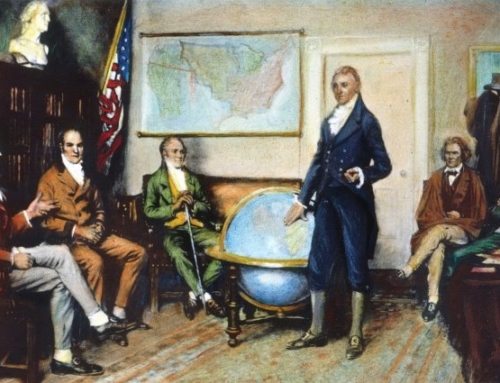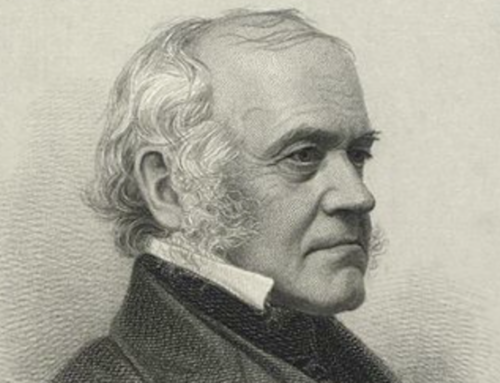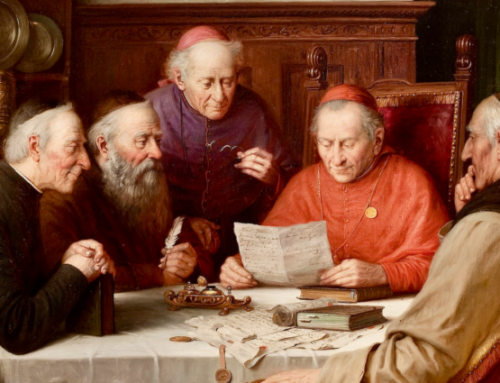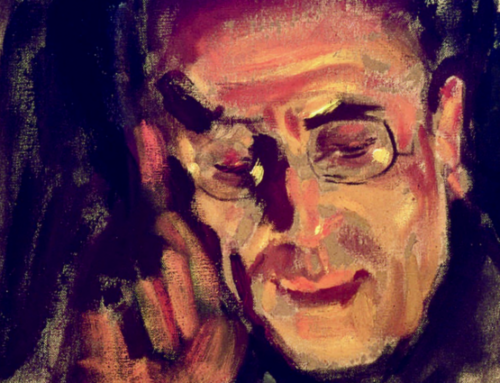The West above all developed the capacity for self-reflection and self-criticism, acknowledging that what is, if wicked or decrepit, can be changed or replaced, and that what is not, however improbable or preposterous, can be brought into being. This recognition filled the world with a host of new possibilities.
 To many in the United States and throughout the Western world, the past has become a curse visited on the present. Disgusted by the sins of our forebears, we revile and even hate them. At the very least, we feel shame and remorse at their myriad inadequacies, unwilling to forgive them for not being like us. Wisdom and decency seem to require the abandonment of all that our predecessors have done. The future, survival itself, depends on starting over, on beginning again, as one recent book has suggested.[*] Such impulses form the essence of “cancel culture,” the latest slogan to engage public attention in the ongoing battle for the soul of Western Civilization.
To many in the United States and throughout the Western world, the past has become a curse visited on the present. Disgusted by the sins of our forebears, we revile and even hate them. At the very least, we feel shame and remorse at their myriad inadequacies, unwilling to forgive them for not being like us. Wisdom and decency seem to require the abandonment of all that our predecessors have done. The future, survival itself, depends on starting over, on beginning again, as one recent book has suggested.[*] Such impulses form the essence of “cancel culture,” the latest slogan to engage public attention in the ongoing battle for the soul of Western Civilization.
The attacks on West are real enough. Some are dangerous; others are harmless. Some are warranted; others are unreasonable. Some are careful and astute; others are idle and stupid. Advocates vow to defend tradition. Their rivals promise to defy it. Some insist that they espouse stability and order. Others, equally resolute, contend that they will dispose of privilege and remedy injustice even at the cost of prompting anxiety, fear, and unrest. In keeping with the diversity of Western thought, there is something to enchant and something to offend almost everyone. We embrace our vision and malign the perspective of those with whom we disagree. Everyone believes they are right and their antagonists are wrong.
But the history of the West has been neither simple nor unitary. It is, instead, a series of conflicts and dichotomies of which the current debate is but another iteration. If we prefer, we can ignore or dismiss certain religious beliefs and practices, certain political creeds and institutions, certain styles of painting, music, and literature, certain expressions of manners and morals, certain eras, and even entire peoples. These vigorous efforts to cleanse the past will not, in the end, enable us to rid ourselves of it. The past continues to influence the present. We remain a part of everything that we have reversed, expunged, or annihilated, and it will shape our individual and collective identities for as long as the West survives. Like it or not, if we wish to go on we have to live with persons, arrangements, and ideas that we question or despise. Were we by some mischance to wipe away the crimes of the past and to erase the men and women who committed them, we would at the same time extinguish ideas that we profess to cherish, such as individual freedom and human rights, for which the same culprits whom we detest were also responsible.
It has, of course, long been commonplace to reproach the “dead white men” of the West and to reject the world they made. To be both just and accurate, history abounds with a record of their misdeeds: oppression, exploitation, war, slaughter, xenophobia, sexism, racism, and more. Of these and other offenses they stand accused and convicted. But where would we be without them? In religion, science, art, philosophy, and government they developed original ideas and fashioned unique institutions that they offered as a gift to the rest of the world.
By the eighteenth century, for instance, enlightened thinkers throughout Europe and America shared a common set of ideals, attitudes, beliefs, desires, and purposes. They rebelled against the Middle Ages. They opposed the Ancien Regime and spoke instead of universal liberty, human progress, and the rights of man. Nor did they advocate these principles exclusively for themselves. Rather, they believed that the attainment of liberty, the benefits of progress, and the possession of rights applied to all humanity. When we invoke human rights today, we are expressing in a different language the convictions of the Enlightenment.
During the eighteenth century, the idea that all men had rights and should enjoy equality before the law was new and powerful. It found political expression first in the American and then in the French Revolution. Revolutionaries on both sides of the Atlantic appealed not to the special rights or characteristics of Americans or Frenchmen, but to the nature and rights of man, which they thought universally valid. The conviction that all men were by Nature and Nature’s God endowed with certain inalienable rights was enshrined in the great documents of those revolutions: The Declaration of Independence and The Declaration of the Rights of Man and Citizen. Whatever their limits, these revolutions and the eighteenth-century thinkers who made them identified their cause, values, and interests with the cause, values, and interests not of one class or people but of humanity as a whole. If they were arrogant, imprudent, and on occasion insincere and dishonest, they also inspired the sentiment that improvements in law, government, and the economy that profited some ought to profit everyone—that society, in other words, should be organized around universal standards of justice.
The revolutionaries dreamed of a world in which people arose to shake off the degradation of the past. Inspired by these revolutionary hopes, Toussaint L’Ouverture demanded for the slaves of Saint-Domingue (Haiti) a share of the dignity and freedom that the American and French revolutionaries sought for themselves. By 1792, Toussaint had become the recognized leader of the insurrectionary slaves. After winning their freedom in 1793, Toussaint and his followers joined the French and, in 1798, obliged the English to evacuate Saint-Domingue. Toussaint’s army went on to invade the Spanish colony of Santo Domingo in 1801 and to free the slaves there.
After defeating the Spanish, Toussaint was the master of Haiti. His government was stern but efficient and just. He also withstood Napoleon Bonaparte’s efforts to reinstitute slavery. In 1802, Napoleon’s brother-in-law, General Charles Victoire-Emmanuel LeClerc, commander of French troops in Haiti, set a trap for Toussaint. Leclerc captured him, charged him with treason and conspiracy, and deported him to France. He died in an Alpine prison the following year. Despite Toussaint’s ignominious fate, the slave revolution that he led marked a turning point in the history of the Western world. Toussaint was a remarkable man in an age dominated by remarkable men. Between 1789 and 1815, no one save Napoleon himself played a more important role in shaping the history of his and future times than did Toussaint L’Ouverture.
Fifty percent, and perhaps as many as seventy percent, of the 500,000 slaves on Saint-Domingue in 1791 had been born in Africa. To use a contemporary phrase, they did not “speak two words of French.” Yet, at the height of their revolutionary movement, Toussaint presented a constitution for the independent republic of Haiti that declared these former slaves to be “free and French.” That expression was much more than a rhetorical testament of sovereignty for the new African-American state that Toussaint was trying to establish. Nor did Toussaint wish to transform black African Americans into white Europeans. By inserting the phrase “free and French” into the Haitian constitution, Toussaint meant to identify his cause and his people with the revolutionaries in France who aspired to bring liberty, equality, and fraternity to all men.
Before the slave revolution in Saint-Domingue, all slave uprisings, from those of the Roman Empire to the massive rebellions in Jamaica, Guiana, Brazil, and elsewhere in the New World, had been defensive. The rebellious slaves, sometimes numbering in the thousands, intended only to withdraw from slave society and to restore as much of the traditional African way of life as they could recall. Some of these rebellions succeeded. The Maroons in Jamaica compelled the British to sign treaties that guaranteed their autonomy. Communities of former slaves in Surinam attained similar considerations from the Dutch. In Brazil during the seventeenth century runaway slaves established a huge colony of approximately 20,000 persons at Palmares and resisted first Portuguese and then Dutch troops for more than a century before capitulating to superior military force. But as courageous as were these attempts to escape slavery, none of them denounced or challenged slavery as a system.
Events in Saint-Domingue were different. There the slave rebellion passed into a national revolution aimed not at reconstructing a lost African world, but at ending slavery and founding a modern, independent black state. Toussaint’s slogan “free and French” offered the former slaves of Saint-Domingue a new definition of themselves. It revealed that the citizens of this new state were to exercise the same freedom and equality, the same rights of man and citizen, as the French Revolution had promised to the world. With those simple words, Toussaint captured the essence of an epoch that historians call the Age of Revolution. The slave revolution in Saint-Domingue represented the entrance of blacks into modern history. No longer did they desire merely to withdraw from society into some half-remembered African past. They instead determined to end their isolation and to earn an equal place for themselves among the peoples of the world and the community of nations.
From the outset Toussaint understood that the best prospects for blacks lay in gaining their citizenship, not merely in acquiring their freedom. The assertion of freedom was, by itself, insufficient. Freedom meant little apart from the laws and institutions that made and kept men free. To that end, Toussaint demanded respect for the rights of the former slaves as individuals and citizens. He labored to ensure their equality before the law. He insisted on their participation in the politics of an emerging democratic world. Toussaint owed this uncommon prudence and foresight to the deliberations of the Enlightenment and the canons of the French Revolution. If we “cancel” the men who enslaved Africans, we must also “cancel” the men who ended slavery. Like the Lord, history often works in mysterious and disquieting ways.
“Cancel culture” is the product of a utopian fantasy that has periodically recurred in the Western mind, nowhere more so perhaps than in the minds of the philosophes themselves. It grows from a hostility toward all that was and is, and exposes a wish to reimagine all that will be. It conveys a longing to shed the complexities of an advanced civilization and to restore simplicity and innocence, as if the return to a simpler way of life would by itself ensure the triumph of civility, virtue, happiness, and love. The objective is emancipation–the flight from an unsavory past, from all manifestations of bias, cruelty, and ignorance, from restraints of any kind–and the coincident opportunity to savor all the rights to which every individual is entitled. It is a call to action in a moribund society that seems to be going nowhere, ensnared by its historic conventions and outworn prejudices. It reflects the hope that by reinventing self and world men and women will automatically create a better future.
Like earlier utopian enterprises, “cancel culture” is a fool’s errand. Yet, it is equally foolish to assert the cultural, intellectual, political, and moral superiority of the West. The legacy of Western Civilization is at once heroic and tragic. Western thinkers were the first to emphasize the sanctity of the individual and to promote individual freedom. They denounced slavery, exploitation, injustice, and torture. Europeans and Americans have not always been faithful to these commitments. But it is false and pernicious to assert that they have never upheld them or fought to expand them. However unreliably, the West has made a habit of giving voice to the unspoken aspirations of mankind.
The Western tradition has thus bequeathed to its modern heirs a dual legacy. They have inherited both the good and the evil that the West has done. Constructing roads and bridges, erecting dams and power plants, building hospitals and schools, treating the sick and educating the young, all while providing access to clean water and wholesome food, are commendable achievements. The reintroduction of slavery during the sixteenth century, along with the imposition of rationalism, scientism, colonialism, bureaucracy, and nationalism in nineteenth and twentieth, sacrificed indigenous cultures to Western interests and ambitions.
The ideals of the West are now passing historical judgment on the civilization of the West. Even as Western governments endorsed freedom, justice, and equality for all, even as Western leaders praised the dignity of man and the autonomy of the individual, they conquered and exploited other peoples, at the same time making those peoples more keenly aware of their subjugation and enslavement. Western jurisprudence, theology, political theory, and social ethics furnished colonial peoples with their most effective tools of resistance. Their demands for justice, independence, and liberty reflect the wisdom that they have acquired from the West.
For religious and secular thinkers in the West carried out a revolutionary transformation between the Middle Ages and the Enlightenment. They questioned the hierarchical order of society, arguing that relations of authority and subordination were not the immutable consequence of divine will. Fate did not require men and women to accept poverty, injustice, or absolutism. What human hands had made other human hands, for good and for ill, could alter or undo. Although John Calvin required Christians to obey legitimate political authority, Calvinist scholars and theologians were the first to articulate a cogent theory of revolution. When rulers ignored or violated the laws of God, the faithful had a duty to oppose them, thereby limiting or eliminating the authority that government could exercise over the individual conscience. Whether political or intellectual, revolution is itself a Western concept.
The West above all developed the capacity for self-reflection and self-criticism, acknowledging that what is, if wicked or decrepit, can be changed or replaced, and that what is not, however improbable or preposterous, can be brought into being. This recognition filled the world with a host of new possibilities. Those who today condemn the West for its racial, class, and gender biases, who regard Western values as a mere pretense for hypocrisy and deceit, who reject Western attitudes as a cynical justification of privilege and power, disregard the creative potential that the West originated and unleashed. Critics may at last succeed in expunging from the history and traditions of the West those aspects to which they take particular umbrage, but they have yet to explain what, if anything, they will recommend as a substitute. In all probability, should the fabric of Western Civilization continue to be shredded, only tattered fragments will remain. Society can then take a step backward, retreating not into enclaves of freedom and independence but of discord and confusion.
[*] Eddie S. Glaude Jr., Begin Again: James Baldwin’s America and its Urgent Lessons For Our Own (New York, 2020).
This essay first appeared here in June 2021.
The Imaginative Conservative applies the principle of appreciation to the discussion of culture and politics as we approach dialogue with magnanimity rather than with mere civility. Will you help us remain a refreshing oasis in the increasingly contentious arena of modern discourse? Please consider donating now.
The featured image, uploaded by Gernot Keller, is a photograph of the bronze statue of Constantine the Great outside York Minster, England. This file is licensed under the Creative Commons Attribution 3.0 Unported license, courtesy of Wikimedia Commons.







This even handed and thoughtful review of western thought tells the story of man: good and bad with changes over time. I like the thought -new to me- that cancel culture hits on a familiar, repeating theme in western history: heroic purity seeks to abolish an impure world.
What’s old is new. What’s new is old.
“The ideals of the West are now passing historical judgment on the civilization of the West.” I admire the elegantly turned phrase, particularly when it captures an essential truth. This one catches the edgy dichotomy of our times. This is not a failure unique to the West or to any other population: it’s our common human heritage. People have always articulated high ideas and then failed egregiously to live up to them. We need to confront these failures with charity and humility, realizing that the high aspiration neither vindicates the failure, nor does the failure necessarily vitiate the ideal.
“Critics may at last succeed in expunging from the history and traditions of the West those aspects to which they take particular umbrage, but they have yet to explain what, if anything, they will recommend as a substitute”
Indeed, they have yet to explain, and I would suggest that we should not hold our collective breath for them to do so. The cancellers are willy-nilly not seeking merely to correct. At least some of them hate being itself and would induce in others both a hatred of being and self-loathing to boot. In that way they will, they assume, gain others to their demonic calling.
The author asserts toward the end that “it is equally foolish to assert the cultural, intellectual, political, and moral superiority of the West.” While that legacy is far from perfect (but “tragic”?), that sentence seems to get too uncomfortably close to the “Woke” perspective. Why yield an inch to them?